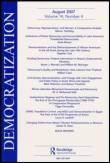This article discusses the nature of the political transformation process that the Islamic Resistance Movement (Hamas) has undergone over the past decade regarding, first, political participation in Palestinian institutions, and second, the issue of negotiations and compromise with Israel. Finally, it explores how the European and international pressure on Hamas for unconditional concessions towards Israel has affected the internal political dynamics of the movement. Based on fieldwork interviews with Hamas leaders in Palestine, Syria, and Lebanon, the article analyses the transition process as perceived on the part of Hamas, and concludes that Hamas was, at a certain point, receptive to external pressure for moderation as it adapted a range of 'moderate' positions in its quest for international recognition. However, when the chain of conciliatory steps undertaken by Hamas failed to ease the international sanctions on the Hamas government, the pressures backfired by weakening the moderate forces in the Hamas leadership and strengthening the radical forces that apparently took the lead when Hamas-affiliated forces took over the Gaza Strip in June 2007. It is argued that the entrance of Hamas into politics represented an opportunity rather than an obstacle for Palestinian democratization, although the opportunity was spoiled by the EU-backed international boycott of the Hamas government.
Hovdenak, Are (2009) Hamas in Transition: The Failure of Sanctions, Democratization 16 (1): 59–80.







